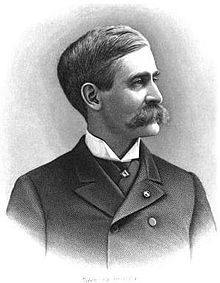Eugene McLanahan Wilson (December 25, 1833 – April 10, 1890) was an American lawyer and Democratic politician who served in various legal and political offices in Minnesota including as a member of Congress and as the fifth and seventh mayor of Minneapolis.
Eugene M. Wilson | |
|---|---|
 | |
| Member of the U.S. House of Representatives from Minnesota's 2nd district | |
| In office March 4, 1869 – March 3, 1871 | |
| Preceded by | Ignatius L. Donnelly |
| Succeeded by | John T. Averill |
| 5th Mayor of Minneapolis | |
| In office April 9, 1872 – April 8, 1873 | |
| Preceded by | Eli B. Ames |
| Succeeded by | George A. Brackett |
| 7th Mayor of Minneapolis | |
| In office April 14, 1874 – April 13, 1875 | |
| Preceded by | George A. Brackett |
| Succeeded by | Orlando C. Merriman |
| Personal details | |
| Born | Eugene McLanahan Wilson December 25, 1833 Morgantown, Virginia, U.S. (now West Virginia) |
| Died | April 10, 1890 (aged 56) Nassau, British West Indies (now The Bahamas) |
| Political party | Democratic |
| Spouse |
Elizabeth Kimball (m. 1865) |
| Children | 4 |
| Parent |
|
| Relatives | Thomas Wilson (grandfather) |
Early life
editWilson was born in Morgantown, Monongalia County, Virginia (now West Virginia) on December 25, 1833. His father Edgar C. Wilson had been a lawyer and US representative from Virginia (as had his grandfather Thomas Wilson). On his mother's side he was the great-grandson of Isaac Griffin, also a longtime US Representative from Pennsylvania. He attended school in Morgantown and graduated from Jefferson College in 1852. He studied law, was admitted to the bar in 1855 and relocated to Minnesota shortly thereafter.[1]
Career
editWilson worked in Winona, Minnesota for several years in a law practice with former classmate William B. Mitchell. In 1857 he was named United States Attorney for the District of Minnesota and relocated to Minneapolis. During the Civil War Wilson served in the Union Army as captain of Company A in the 1st Minnesota Volunteer Cavalry Regiment. The regiment was primarily involved with the Dakota War of 1862.[1]
After the war, Wilson was elected to the Forty-first Congress (1869 – 1871). He was not a candidate for renomination in 1870. He resumed the practice of law, and was elected mayor of Minneapolis in 1872 and 1874. He was an unsuccessful candidate for election in 1874 to the Forty-fourth Congress. He served as a delegate to the Democratic National Convention in 1876 and was a member of the Minnesota Senate in 1878 and 1879. He was an unsuccessful candidate for Governor of Minnesota in 1888.[1][2][3]
Wilson remained active in social as well as political affairs in Minnesota. He was twice president of the Minneapolis Club, in 1886 and 1890.[4]
Personal life
editWilson married Elizabeth Kimball, daughter of Colonel William M. Kimball, of Minneapolis on October 6, 1865. Together, they had four children.[1]
Death
editWilson died while on a visit to regain his health in Nassau, British West Indies (now The Bahamas) on April 10, 1890.
Electoral history
edit- Minneapolis Mayoral Election, 1872
- Eugene McLanahan Wilson 2,208
- Dorilus Morrison 1,534
- Minneapolis Mayoral Election, 1874
- Eugene McLanahan Wilson 2,533
- George A. Brackett 2,147
- John H. Thompson 415
References
edit- ^ a b c d "Eugene M. Wilson (1833 - 1890)" (PDF). Minnesota Legal History Project. Retrieved July 22, 2021.
- ^ "Wilson, Eugene McClanahan — Legislator Record". Minnesota Legislative Reference Library. Retrieved July 22, 2021.
- ^ "Career of Eugene Mclanahan Wilson". Minnesota Election Trends. Archived from the original on March 3, 2017.
- ^ Edgar, William (1920), Minneapolis Club: A Review of its History from 1883 to 1920 by an Old Member
- United States Congress. "Eugene M. Wilson (id: W000578)". Biographical Directory of the United States Congress. Retrieved on 2009-04-13
This article incorporates public domain material from the Biographical Directory of the United States Congress